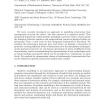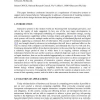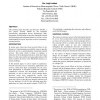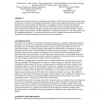HCI
2001
13 years 5 months ago
2001
In spontaneous speech, speakers segment their speech into intonational phrases, and make repairs to what they are saying. However, techniques for understanding spontaneous speech ...
HCI
2001
13 years 5 months ago
2001
This paper argues for a joint development of an eye gaze -based, on-line communication aid running on a standard PC with a web -camera. Tracking software is to be provided as open...
HCI
2001
13 years 5 months ago
2001
A dozen people who cannot speak and have very limited voluntary muscle control because of cerebral palsy or traumatic brain injury have tried using a new technology called the Cam...
HCI
2001
13 years 5 months ago
2001
s, covering different levels of abstraction over the information exchanged. As the protocol is layered, we can discuss interaction in terms of different levels of granularity, bett...
HCI
2001
13 years 5 months ago
2001
HCI
2001
13 years 5 months ago
2001
HCI
2001
13 years 5 months ago
2001
This position paper describes and discusses PALIO1 , a new project recently funded by the European Commission's Information Society Technologies (IST) Programme. PALIO builds...
HCI
2001
13 years 5 months ago
2001
Usability testing typically focuses on methodology and metrics, while the specific interactions being tested are chosen in an ad hoc way. This paper demonstrates a framework for o...
HCI
2001
13 years 5 months ago
2001
HCI
2001
13 years 5 months ago
2001
This study investigates the effect of force-feedback in computer-mediated communication. Participants completed a screen-based maze task with an alleged remote participant in a 2 ...




